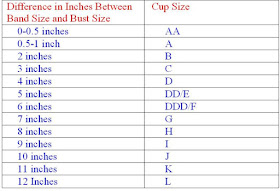The majority of women wear ill-fitting bras – this fact cannot be overemphasized. Wearing a bra with the right size of both band and cup seems to be a moving target. So many parameters are required for a bra to fit properly. But what is the issue if a bra does not fit?
- Breasts overflow at the top
- Straps are bound to fall off
- An ill-fitting bra is not aesthetically appealing
- The band rests on the breasts and not on the ribs
- Feeling suffocated if band is too tight
- Breasts may slip under the band if it is loose
- The required support may not be achieved
- Straps dig in – this may lead to headaches, neck-ache and back pain
A bra that does not fit properly may also result in poor blood circulation, an issue that causes a pricking sensation in the fingers.
So, how do you find your right bra size? The easiest way to do it is to find an experienced bra fitting assistant. They will not only inform you about your ideal size but also show you different styles to try and see which ones have a better look. Not all types of bras will suit you.
How to Measure Your Bra Size
If you can’t find a professional bra shop near you, you can still measure yourself by following these steps:
Step 1
Remove your clothing and stand upright
Step 2
Take a flexible tape measure (like a tailor’s measure) and lay it just below your bust where the band is supposed to be. This measure will give you your correct band size. Be sure that you are standing straight and that the tape is horizontal. Make the measurement a little tighter than is done when measuring for other clothing.
The result you get in inches is your band size. If you get an odd number, like 37, you can try bras with a band size 36 and 38. It’s normally better to start with the lower number.
Step 3
To determine your cup size, place the tape measure on the widest part of your bust. This will usually be on the nipples. Once again, take the measure in inches, with the tape parallel to the floor. Should you get an odd number, opt for the lower even number.
If your bust is saggy, you will get a more accurate figure if you already have a good fitting bra on. If you do not have one, pick one which seems to fit. Adjust it for the fit and not looks.
Step 4
Subtract cup size (step 3) from the band size (step 2). Check in the table below to see your cup size.
Bra Size Chart
Common Bra Issues and Troubleshooting
Problem: Breasts spill over at the top
Solution: The bra cups are too small, or the style does not correspond with your bust shape
Problem: Soreness or redness under the bust
Solution: The cups are irritating the skin because they are most likely small
Problem: Breasts are spilling on the sides
Solution: The bra you are wearing has insufficient breast coverage
Problem: Breasts are falling underneath the band
Solution: The band is too long, or the cups are too small, or both
Problem: Your bust has a saggy appearance
Solution: Your bra has insufficient support
Problem: Band is hiked up by the straps at the back
Solution: You are wearing a larger band size
Problem: The straps are digging into the shoulders
Solution: The band size is too big, the straps are too narrow, or both











